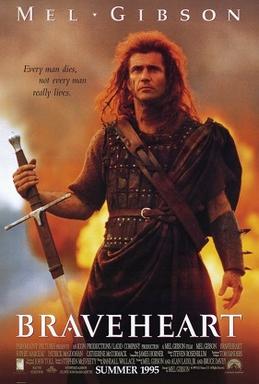WARNING: This article may contain spoilers.
Five years after the success of Braveheart, Mel Gibson once again is cast in another historical epic, this time set in the Revolutionary War and directed by Roland Emmerich, known for Stargate, Independence Day, and that terrible 1998 version of Godzilla. This film is a heavily fictionalized account of The American War for Independence, with it's pro-American propaganda and the exaggerated evil of the British. Is the film worth watching despite it's historical inaccuracies, or are Mel Gibson and the filmmakers repeating the success of Braveheart? Let's examine the case of The Patriot. For my research, I used more than Wikipedia, I watched Youtube videos and read articles.
Deja Vu?
The movie opens in 1776 South Carolina, when widowed war veteran Benjamin Martin and his children were visiting Charlestown to vote for the support of the Continental Army. As a veteran of the French and Indian War and a widowed father, he is reluctant to go to war against British. But his oldest son Gabriel has joined the Continental Army without his permission. After Gabriel was wounded in battle, the British, led by Colonel William Tavington, has taken the family hostage, arrests Gabriel so they can execute him for being a spy, destroyed his home, and has murdered one of the children for trying to free Gabriel. After freeing Gabriel, Benjamin decides to form a militia against the British.
If this sounds familiar, that's because this movie pretty much recycles the same plot from Braveheart, the common family man who wants peace in his life but hell broke loose when an empire destroys his life and he decides to go to war. Rather than making fresh insights into The Revolutionary War, the screenplay from Saving Private Ryan writer Robert Rodat relies on traditional Hollywood cliches you have seen so many times before.
If this sounds familiar, that's because this movie pretty much recycles the same plot from Braveheart, the common family man who wants peace in his life but hell broke loose when an empire destroys his life and he decides to go to war. Rather than making fresh insights into The Revolutionary War, the screenplay from Saving Private Ryan writer Robert Rodat relies on traditional Hollywood cliches you have seen so many times before.
The Real Benjamin Martin
The character of Benjamin Martin is a composite character of Revolutionary War veterans, such as Daniel Morgan, and Andrew Pickens. But the figure I'm most familiar with is Francis Marion, known by his nickname as "Swamp Fox". The family depicts Benjamin Martin as a genuine family man who loves his children and gets along with the film's black characters. Unfortunately, Francis Marion is nothing like Benjamin Martin. While a pioneer in modern guerrilla warfare, he was also a slave owner, a serial killer to Native Americans, and he has raped his female slaves. Francis Marion is a completely different character than the squeaky clean Benjamin Martin.
The Exaggerated Evil of the British
While the British weren't saints during The American War for Independence, they are far from the bloodthirsty monsters as depicted in the film. The film has a clear cut good vs evil story in which the Americans were pure while the British are mindless, thoughtless murderers. Even if they are not killing people, the film uses the old snobby Brit stereotype in some scenes. The most controversial scene in the film is when the British lock up a group of innocent American civilians into a church and they burned it. Not only is there no written record that the British has burned a church filled with innocent people during the Revolutionary War, but the attack was actually taken from a Nazi massacre that was committed in 1944. In the actual incident, the Nazis has rounded up French villagers into a church and and were blown to bits. If this movie wants the British to be the villains, than they should have depict the atrocities they have committed instead of recycling stuff from a different party and a totally different time period.
I didn't cover everything about the film's faithfulness to actual history but I did give you a taste of the movie's pandering pro-American propaganda. But hey, what can you expect from the creators of Independence Day? This film heavily recycles so much material from other historical epics that it's obvious that the filmmakers were only pandering to the Braveheart crowd rather than making a powerful statement about The American Revolution and the film is also biased to the opposite party. Despite some well made battle scenes and good performances, The Patriot is a run of the mill war movie.
I didn't cover everything about the film's faithfulness to actual history but I did give you a taste of the movie's pandering pro-American propaganda. But hey, what can you expect from the creators of Independence Day? This film heavily recycles so much material from other historical epics that it's obvious that the filmmakers were only pandering to the Braveheart crowd rather than making a powerful statement about The American Revolution and the film is also biased to the opposite party. Despite some well made battle scenes and good performances, The Patriot is a run of the mill war movie.





No comments:
Post a Comment